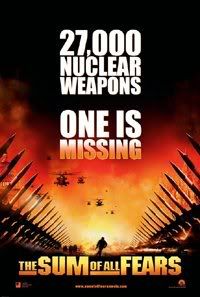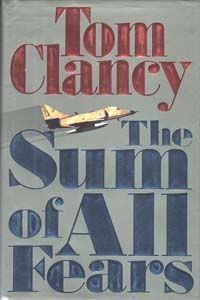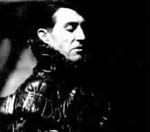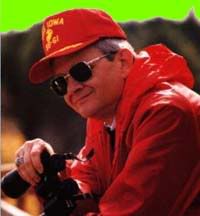
 The Sum of all Fears
The Sum of all Fearsby Tom Clancy
GP Putnam's Sons 1991 (US)
HarperCollinsPublishers 1991 (UK)
pp 1030
This is one of the quotes with which authour Tom Clancy opens his 1991 thriller The Sum of all Fears. I recently snapped up the DVD when it was on sale at XV, the draughty old fen's charity shop. Directed by Phil Alden Robinson and released in 2002 - it was held back when 9/11 occurred just as they were putting it to bed - it differed somewhat from the book, which inspired me to pick it out of my shelf-ful of Tom Clancy books and read it again.Why, you may take the most gallant sailor, the most intrepid airman or the most audacious soldier, put them at a table together - what do you get? The sum of their fears.
- Winston Churchill
In one of the DVD's special features, director Phil Alden speaks of the difficulty of rendering such a large book into a film of just over two hours. I can't argue with that - my dogeared copy of The Sum of all Fears, at 1030 pages, is around a third again as long as Harry Potter and the Deathly Hallows, which Warner Bros have found themselves having to split into two films.

The film of TSAF opens with a pilot in the 1973 Yom Kippur War between Israel and Syria over the Golan Heights flying into an anti-aircraft-missile through a fatal error. His cargo, a nuclear warhead, is buried without detonating and lies there for many years, having been covered by the Druse farmer who needs every square inch of land to eke out a living.
The book and film share this plot-point in common. They also have a stand-off between the American and Russian presidents over an atomic device that has exploded at a football stadium, made from uranium which the US stole from one of its own reactors and gave to the Israelis. The similarities just about end there.
In my opinion, The Sum of All Fears is Tom Clancy's darkest book, and, like many works which explore our shadows, his most profound. After the prologue referred to above, at the start of the book we see Jack Ryan in the midst of a physical and mental breakdown. He is smoking and drinking too much, and is experiencing problems in his relationships with his wife and son - which drive his mood lower - mostly due to overwork and "carrying" people who are senior to him but are not as good at their jobs as he is at his - and theirs.
As the screw tightens, the group whom President Bob Fowler has promoted to high office through an old-boy's network starts to break down, the chief buckler under pressure being Fowler himself. "Old boys" is the operative term - the only woman in this inner circle has attained her position through sexual favours.
It surprised me that Liz Elliott doesn't pop up in the film, because she is central to moving forward much of the American part of the plot before the bomb goes off. Those parts of the novel dealing with the downward spiral overlapping Jack Ryan's work and home life seem to comprise a meditation upon Othello (Clancy has a degree in English). In particular, how Elliott, the scheming National Security Advisor, latches on to the insecurities of the flawed ruler, but overstretches herself and finds that Cathy Ryan cannot be forced into the role and the fate of the credulous wife, suggests a recontextualisation of the play with a twist. The key difference is that Clancy has the grizzled old warrior John Clark communicate important information to Cathy about Jack’s relationship with the widow of a former comrade: Desdemona's swapping notes is the one thing that could have undone Iago in Othello. The showdown between Cathy Ryan and Elliott is a masterpiece of observation about women's cultured brutality towards each other in the theatre of manners: the sort of scene that strikes a room quiet - ostensibly through shock, in reality so the audience doesn't miss a thing.
In criticizing the film for not following the book, I realize it’s unfair to ask Alden transfer Clancy’s prose in the prologue to celluloid. He compares Israel’s challenge in the Yom Kippur war to the Greeks’
 victory over the Persians at Thermopylae, the Allies pushing back Nazi lines at the Bastogne section of the Battle of the Bulge, and the Gloucesters and other regiments facing the Red Army at Korea’s Hill 235. The story arising from a solution to the middle-east crisis, TC’s references to heroic struggles against vastly superior numbers presents us with an idea of Israel’s everyday position. There are also references to Tsar Nicholas II, who is blamed by many Russians for hastening the October revolution by entering World War I while the country was in a state of military unpreparedness, and to Moedred (Mordred), the Arthurian traitor who helped bring down the original Camelot.
victory over the Persians at Thermopylae, the Allies pushing back Nazi lines at the Bastogne section of the Battle of the Bulge, and the Gloucesters and other regiments facing the Red Army at Korea’s Hill 235. The story arising from a solution to the middle-east crisis, TC’s references to heroic struggles against vastly superior numbers presents us with an idea of Israel’s everyday position. There are also references to Tsar Nicholas II, who is blamed by many Russians for hastening the October revolution by entering World War I while the country was in a state of military unpreparedness, and to Moedred (Mordred), the Arthurian traitor who helped bring down the original Camelot.The crisis comes to boiling point not through military action, but when a group of students stops throwing stones at soldiers and commences on a course of civil disobedience, after the manner of Mahatma Gandhi or Martin Luther King. Footage of an Israeli policeman killing a non-violent protester with rubber bullets is beamed around the world. Ryan comes up with a possible solution to the resulting international situation: it is a brilliant vision which Liz Elliott assures is not credited to him, his crime having been to speak to her robustly. The book is the story of how that vision is attacked by a cabal of those for whom that vision would leave reasons for living, and indeed pockets, empty.
In the film, as in the book, the object of the terrorists' actions is to create a war between the US and Russia. Alden uses a special feature in the DVD to defend himself from charges of political correctness by changing the villains to a neo-Nazi group, although it appears that there was extensive lobbying by the Council on American-Islamic Relations to effect this result. One of the characters we are therefore presented with is a neo-Nazi Russian air-force officer, which frankly I find hard to swallow. Robinson could have exploited far greater opportunities for stereotype-busting by exploring the motivation of the pacifist Palestinian students. (It should be noted that Clancy defended Islam before the sun had set on 9/11.)
Thankfully, Clancy has no need to defend himself from any such accusation - he simply writes his books, and leaves it up to readers as to whether or not to spend money and time on them. We are happy to invest both.
His original villains are Palestinian terrorists who recruit a disaffected Native American as they refashion the bomb's original fissile material into a new, improved bomb. The only reference to Nazis of any vintage that I could make out was that the East German nuclear physicist Manfredd Fromm's father had been a member of the anti-Nazi resistance in Germany who was executed by the Reich, and is willingly recruited by the terrorists because he sees the Deutsche Democratische Republik's return of material and research to Russia redux as a betrayal of both his life and his father's sacrifice.
Clancy's villains are no two-dimensional baddies: they love, feel loss, and often regret those of their actions which entail the murder of innocents. He anticipates, and provides a foil to, the
 phenomenon manifested in modern politics whereby, as Michelle Malkin notes, politicians assume that educating terrorists will kindle empathy in their hearts and turn them away to a less destructive way of living. (Tony Blair's Opposition soundbite "education, education, education" seems to have been an early manifestation of this.) But TC's terrorists dismantle an atomic warhead and build a hydrogen bomb; and in the real world, terrorists learn how to fly aeroplanes, design missiles that can carry goodness knows what in the head, and manufacture chemical and biological weapons - even if they lack a heart-warming frisson, they're quite brainy. The only baddie without an emotional dimension - Marvin Russell, the Native American - is executed by his masters precisely because of this lack: he kills without it having any effect whatsoever on him, a manifestation of extreme antisocial/sociopathic personality disorder. As Clancy states succinctly, "there was something missing".
phenomenon manifested in modern politics whereby, as Michelle Malkin notes, politicians assume that educating terrorists will kindle empathy in their hearts and turn them away to a less destructive way of living. (Tony Blair's Opposition soundbite "education, education, education" seems to have been an early manifestation of this.) But TC's terrorists dismantle an atomic warhead and build a hydrogen bomb; and in the real world, terrorists learn how to fly aeroplanes, design missiles that can carry goodness knows what in the head, and manufacture chemical and biological weapons - even if they lack a heart-warming frisson, they're quite brainy. The only baddie without an emotional dimension - Marvin Russell, the Native American - is executed by his masters precisely because of this lack: he kills without it having any effect whatsoever on him, a manifestation of extreme antisocial/sociopathic personality disorder. As Clancy states succinctly, "there was something missing".As always, Clancy tells of high intrigue through personal stories in such a way as to hold up a mirror to each of his readers. We might not understand the Washington insider or the subsistence farmer, but we understand loss and human weakness and the love for one's family that keeps you muddling on when other hopes seem fled. Jack Ryan, snowed in at his office while the bomb goes off in Denver, manifests a calm in the face of seeming hopelessness that we all have felt, that perversely helps us get through the sum of our fears in the hospital waiting room or the mortuary and back to better times. The story of how Jack achieves this, an impossible feat without the support of those who love him, is - among many other things - a story of personal redemption within a fragmented, hostile world where our enemies are not necessarily those towards whom our defences are directed, and friendship often hides under one's radar to surface at the most unexpected times. The east-west emergency having been fuelled not just by malicious design but by a spiral of errors worthy of the Bard, Jack will need to draw on all his reserves of will, refilled by his friends as, after he has declared that Fowler has disappeared into his own contradictions, he faces his greatest temptation ever.
The Sum of all Fears was written as the Soviet Union was disintegrating and was released as Russia rose from the former's ashes, and is possibly more relevant today than when it was published. I have revisited this Thucydidean epic many times, like an old friend, and each time seen something I had previously missed about the human condition, realpolitik and often both. If you are under 30 and value exquisitely-written thrillers, I heartily recommend this book. If you are over 30, read it - whether it's for the first time or the fifth - and you will see echoes of your life and your country, wherever that may be.












No comments:
Post a Comment
Please feel free to leave a comment - Frugal Dougal.